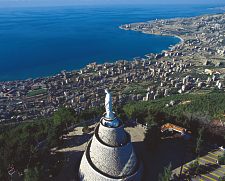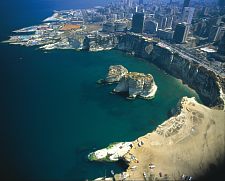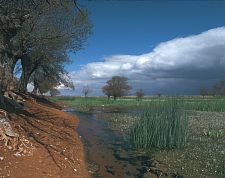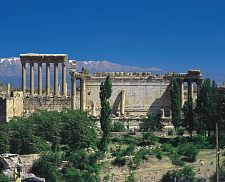|





| |
A New War in Lebanon or a Coup d’état in Syria…
Necessary Alternatives for Calm in Iraq?
by Don Quixote*
September 15, 2005
[Text in PDF]
The Lebanese scene has always been a stage for regional and international
conflicts in the Middle East. When others in the Middle East fight (Israel and
the Arabs: 1948 and 1967), Lebanon enjoys a relative calm. When others calm down
(since 1967), Lebanon goes to war; that was the case until 1990. Back then Iraq
attacked Kuwait and the US came in to push Saddam back. The war was moved to the
Arab Gulf. Simultaneously, the situation inside Israel heated up between
Israelis and Palestinians.
So at a time when the international cold war calmed down in Lebanon and the
regional wars in the Gulf and within Israel were booming, the so-called "civil
war" in Lebanon came to an end and Lebanon entered a period of calm and
stability except for the occupation - Israel in the South and Syria everywhere
else. Aside from resistance movements, there was no more civil war in Lebanon.
War was taking place somewhere else in the Middle East.
Today, a civil war seems to be looming on the horizon; the stage will be in one
of three places: Iraq (and we saw its beginnings), the Palestinian Territories
(mainly Gaza), or Lebanon.
If it takes place in Iraq, it will mean an apparent failure of the US control
over Iraq. If it takes place in Gaza, it will mean unrest near Israel and a
flood of Islamic fundamentalists therein. So it may be in the interest of
everyone else to move that war from Iraq or the Palestinian territories to a
land where civil war is customary and where the damage is confined to within the
borders: Lebanon.
It is secret to no one that a state of hostility exists today between the Hariri
administration in Beirut and the Assad regime in Syria. The policies and
behavior of the Hariri leadership and his allies towards the Syrian regime lead
many observers to conclude that Hariri is working to topple the Assad regime,
believing the latter was behind his father’s assassination. Of course, Hariri’s
attacks so far have been limited to the international courts of diplomacy.
Whether Hariri is the strategic master of his act or whether he is being
manipulated by foreign powers in that direction will be determined as history
unfolds.
But our history teaches us some good lessons when it comes to regional
conflicts:
1) Lebanon is the magnet “par excellence” for all conflicts in the region.
2) The Syrian regime (at least under Assad the father) has always managed to
gain international acceptance by wiggling itself into an American scheme and
playing the role dictated to it by the US. This is how Assad managed to
successfully defray internal unrest in Syria to the Lebanese stage. This is how
Assad managed to snatch from the Arab League and subsequently from the US with
Arab endorsement a blessing for his thirty years of occupation and exploitation
of Lebanon and the Palestinian cause. And sadly, this is where the Lebanese have
always naively played the role of the perfect dummies of regional conflicts.
Will things be different this time?
Will Hariri conquer the Assad regime in Syria before the latter attacks him in
Beirut?
Between Hariri and Assad, will the US continue to favor Hariri? Or will it
revert back to the tried ones?
This may ultimately depend upon who gives the best guarantee to take the war out
of Iraq.
If the Assad regime manages to stir civil war again in Lebanon and turn it into
a sinkhole for all regional conflicts, particularly Iraq, Assad will survive.
On the other hand, if Hariri beats Assad to the game and topples his regime in
Syria, then a civil war will have to ensue there, at least between Alawites and
Sunnis in its early stages. This civil war will defray Sunni power from Iraq
into Syria – after all the Sunnis have a better shot at taking over Syria than
at regaining Iraq – relieving thereby the pressure off the burgeoning
pro-American regime in Iraq and off the US troops and the oil therein.
Consequences of this war as it develops over time may include a partition of
Syria and a new home for the Palestinian refuges from all over the world. The
effects of the Syrian war will undoubtedly spill over to Lebanon: a new civil
war and partition.
But civil war in Lebanon may be avoidable. The Hariri administration will have
to walk a fine line between going after the assassins, implementing
international will, reducing hostility with the Syrians and mending fences with
various Lebanese communities.
Of utmost importance is a positive dialogue between Hariri and his camp on one
side and other political camps and leaders in Lebanon. The outpouring of
negative speeches from the porte-paroles of Hariri (“Future” media, Walid Eido
and his likes in Parliament and the Cabinet) and from Walid Jumblat and his
chorus (Aridi, Faour etc.) will only create internal strife and generate
similarly negative rhetoric from all other sides.
Mr. Hariri and his allies are a de-facto majority and must behave as such. The
golden rule in building a modern and peaceful democracy is for the majority to
attend to the needs of minorities and to appease their fears; for the minorities
always try to protect what they have and try to obtain more. They are in
constant fear of annihilation (political or otherwise). This can lead the
minorities to seek help elsewhere, perhaps beyond the border. So Mr. Hariri must
take actual leadership of his group, silence the fighting drums on his side and
reach out openly to the Christians - not just the ones he brought with him to
Parliament but also Bkerki and Aoun – and reach out openly to the Shiites groups
and make sure they know what he is planning, and reach out to other Sunnis to
bring them in.
The Lebanese people can no longer afford unrest or a new war. They deserve to
live in peace. So that all the martyrs who fought for a free and peaceful
Lebanon may rest in peace.
*The voice of one… or maybe thousands.
|